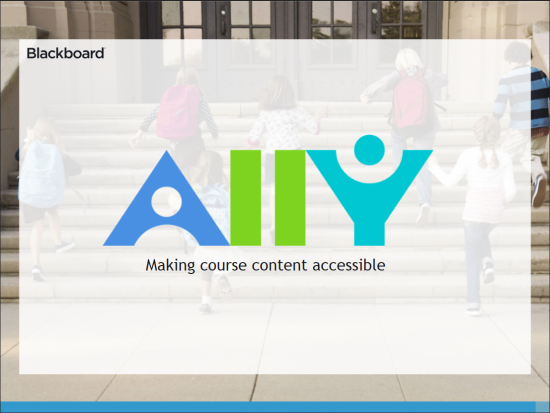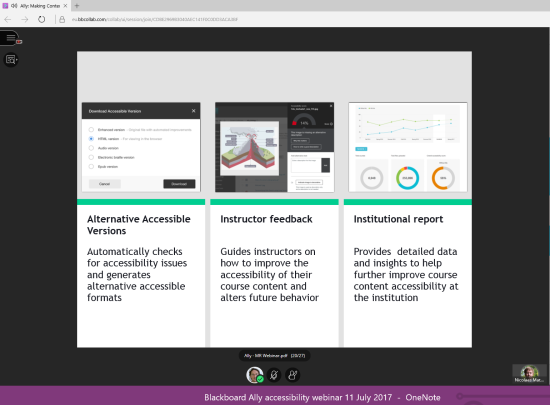Ally: a game changer for accessibility
July 12, 2017 at 10:55 am | Posted in educational, systems | Leave a commentTags: accessibility, Blackboard

Yesterday I attended a Blackboard webinar about their new system, Ally, and immediately saw that this would be a ‘must-have’ for any institution that is serious about improving the accessibility of their online resources. Ongoing changes to the Disabled Student Allowance have made institutions legally responsible for providing reasonable adjustments for students with learning differences and disabilities, and Ally offers three ways to meet that duty.
Automatic creation of accessible versions of resources
Ally integrates with Blackboard’s normal workflow, so tutors upload their files using the same process as they currently use (which now includes drag-and-drop) and the primary link is to that file (e.g. a Word, PowerPoint or PDF document). A new dropdown menu offers links to accessible versions; HTML, ePub, electronic Braille or audio file. These versions are only generated by Ally the first time a student requests it, and are stored by Ally so do not take up additional storage space on our Blackboard servers. Ally uses Amazon Web Services for processing and storage, and offers institutionally-controlled cloud storage if required.
I was really impressed with the quality of the conversion from original file to HTML. Ally uses sophisticated semantic structural analysis and machine learning to recognise headings, lists and tables and even deals with multi-column layouts, maths and equations. The HTML version is used as the basis for the other accessible formats.
So Ally provides students with accessible versions of documents without any additional effort or input from tutors. That in itself is a major win, but wait – there’s more…
Nudging tutors to improve the accessibility of their resources
When the tutor views the resource item in Blackboard, they see a small coloured ‘gauge icon’ alongside the link. Green indicates good accessibility, orange is so-so and red means it needs improvements. Clicking the icon brings up detailed feedback on what the problems are and what the impact on students is – for example if images embedded in the document do not have ALT text, then students with visual disabilities cannot access them at all. Ally also offers context-sensitive advice about the practical steps needed to resolve the issue (e.g. how to add ALT text in Word). Tutors can upload a revised version of the document and immediately see its improved rating.
Institutional oversight of accessibility data
The final aspect of Ally is designed to help institutions meet their legal duty by providing the data that enables accessibility to be measured and improvements to be tracked over time. It lists the most common issues, and identifies those modules that need significant work. The administrators can drill down to individual modules and resources, so care will need to be taken to ensure that tutors get appropriate support and advice and that this is not seen as a performance management tool.

It’s easy to see how these three aspects of Ally work together to enable institutions to make a step-change in the accessibility of their learning resources – and that’s why I think Ally is a game-changer. How can an institution NOT offer this facility?
As a final note, I was really impressed that Ally already works with Blackboard, Moodle Rooms and Canvas Instructure, and will soon be available for stand-alone Moodle and even D2L’s Brightspace (Blackboard’s main rival). That’s the right move – accessibility for all!
Blackboard good practice guide
July 2, 2010 at 10:41 am | Posted in useful links | Leave a commentTags: Blackboard, copyright
I’ve just uploaded this new short guide on EdShare – four sides of A4 that hopefully provide concise advice about essential practices, recommended practices, blended learning, accessibility and copyright. It is always a tension between providing sufficient advice and so much that tutors won’t read it… hopefully this strikes the right balance.
Three stories about Virtual Learning Environments
November 10, 2009 at 2:22 pm | Posted in waffle | Leave a commentTags: Blackboard, Moodle, VLE
By chance, I’ve looked at three stories today about the future of VLEs which are relevant to this University’s use of Blackboard.
The first was an article by Lisa M. Lane in First Monday, titled Insideous pedagogy: how course management systems impact teaching. It argues that the educational assumptions implicit in the design of systems such as Blackboard and Moodle affect the pedagogic choices made by tutors new to teaching online. For example, Blackboard’s default ‘Course Resources’ content area encourages tutors to use it as a document store. Tutors can of course use the Control Panel to configure Blackboard to their own needs, for example by creating a content area for each course topic, but may lack the awareness that it is possible or the knowledge of how to do it. I see the answer as a partnership between academic staff and learning technologists such as myself, where I find out what they want to achieve and then provide the advice and support needed.
The second was a discussion at this year’s Educause conference about the relative merits of commerical VLE systems, such as Blackboard, compared with open-source solutions, such as Moodle and Sakai. The open-source speakers stressed the advantages of a wide user community, lack of licence restrictions, freedom to innovate and the decoupling of paid-for support from the licence provider. The commercial speaker seemed much more defensive and said that Blackboard were improving their customer support and learning lessons from the open-source community. It was interesting that a US University that switched to Moodle made a deliberate decision to maintain their VLE budget and spent the money saved on the licence costs on a programmer and some instructional designers to help the academic staff make better use of the new system.
Finally, an email from ALT arrived advertising a panel discussion with the inflamatory title ‘The VLE is Undead!’. Continue Reading Three stories about Virtual Learning Environments…
Create a free website or blog at WordPress.com.
Entries and comments feeds.



You must be logged in to post a comment.